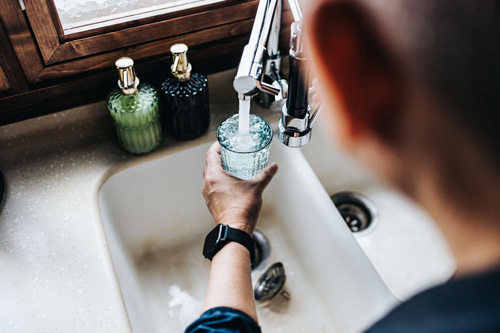Water is a fundamental necessity of life, but sometimes it can throw us a curveball, especially when it starts to taste like metal. If you’ve ever taken a sip and been greeted by a surprising metallic tang, you’re not alone. This phenomenon might leave you wondering what’s going on in your water pipes or if there’s a tiny scrapyard hiding in your faucet. Let’s delve into the reasons behind the metallic taste in your water:
Minerals in Your Water
One of the primary culprits behind the metallic taste in your water is the presence of minerals. While minerals are generally beneficial for your health, their concentrations in water can sometimes exceed desirable levels. Iron and manganese are the usual suspects when it comes to lending a metallic flavor to your water. These minerals often find their way into your water supply from the ground, particularly if you rely on well water.
Understanding the mineral composition of your water is crucial in addressing this issue. Conducting a water test can provide valuable insights into the specific minerals present and their concentrations, enabling you to tailor a solution to your unique situation.

Corrosion of your Plumbing
If your residence has weathered the passage of time, chances are your plumbing system has, too. The aging of pipes, especially those constructed from materials like iron or steel, can lead to corrosion. As pipes corrode, minuscule particles of metal leach into the water, contributing to that unmistakable metallic taste. If you suspect aging pipes are the root cause, it might be time to consider a comprehensive plumbing inspection and potential replacement.
Seasonal Variations
Sometimes, the taste of metal in your water can be a seasonal issue. Changes in temperature or weather patterns can impact the water supply, leading to altered tastes and smells. Heavy rainfall or shifts in groundwater levels can stir up sediments and minerals, influencing the overall composition of your water. Understanding these seasonal variations can help you contextualize and address the issue.
Chlorine Treatment
Water treatment plants commonly use chlorine to disinfect water supplies, ensuring they are safe for consumption. While chlorine itself doesn’t taste metallic, it can react with trace amounts of metals in the water, forming compounds that impart a metallic flavor. If your water undergoes chlorine treatment, this chemical interaction might be contributing to the unexpected taste.
Health Implications
A pressing question when dealing with metallic-tasting water is whether it’s safe to drink. In most cases, water with a metallic taste is safe for consumption. However, it’s essential to understand that the presence of minerals or corrosion in your water can lead to other issues.
- Short-term Effects: Drinking water with a metallic taste is generally safe in the short term. It might be unpleasant, but it’s not harmful.
- Long-term Effects: Long-term exposure to high levels of certain minerals like iron can have health consequences, including potential staining of teeth and clothing. Moreover, excessive iron in drinking water may not taste great and could lead to digestive discomfort.
Consider vulnerable populations, such as infants and individuals with specific medical conditions, who might be more susceptible to the effects of minerals in water. If you have concerns about your water quality, it’s advisable to consult a healthcare professional or your local water authority.
What Can You Do About It?
Now that we’ve uncovered the potential causes, let’s explore practical steps to reclaim the purity of your water:
- Water Testing: Engage in a comprehensive water testing process to identify the specific minerals present. Armed with this knowledge, you can develop a targeted strategy to address the issue.
- Water Filtration Systems: Invest in a water filtration system specifically designed to remove metals and minerals. This proactive approach provides a reliable and long-term solution to ensure a refreshing and metallic-taste-free drinking experience.
- Plumbing Inspection and Maintenance: If aging pipes are identified as the culprit, consult with a professional plumber to assess the condition of your plumbing system. Consider replacing corroded pipes to eliminate the source of metal leaching into your water.
- Contact Your Water Provider: If you’re on a municipal water supply, communicate with your local water provider. They may be able to offer insights into any recent changes or issues with the water supply that could be contributing to the metallic taste.
Contact Atlantic Blue Water Services Today
A metallic taste in your water can be unpleasant, but it is manageable. Identifying the cause and taking action ensures safe and enjoyable drinking water. Seek professional testing and advice from experts or your local water authority if uncertain about water quality.
For reliable water testing, choose Atlantic Blue Water Services. We’re dedicated to delivering pure water and offer well water tests using advanced methods. Contact us at 410-840-2583 for a healthier water supply. Our team safeguards water quality, positively impacting your well-being and happiness.
